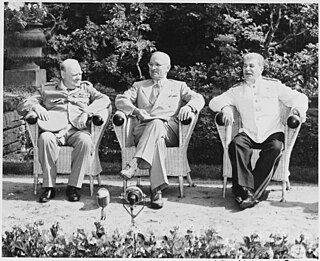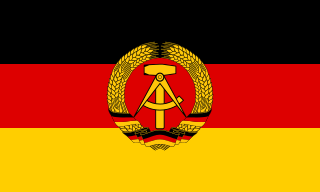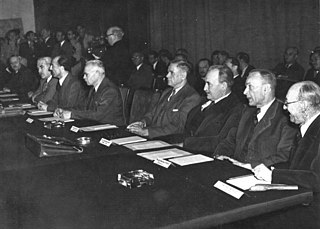
Konrad Hermann Joseph Adenauer was a German statesman who served as the first chancellor of the Federal Republic of Germany from 1949 to 1963. From 1946 to 1966, he was the first leader of the Christian Democratic Union (CDU), a new founded Christian-democratic party, which became the dominant force in the country under his leadership.

The Potsdam Conference was held at Potsdam in the Soviet occupation zone from July 17 to August 2, 1945, to allow the three leading Allies to plan the postwar peace, while avoiding the mistakes of the Paris Peace Conference of 1919. The participants were the Soviet Union, the United Kingdom, and the United States. They were represented respectively by General Secretary Joseph Stalin, Prime Ministers Winston Churchill and Clement Attlee, and President Harry S. Truman. They gathered to decide how to administer Germany, which had agreed to an unconditional surrender nine weeks earlier. The goals of the conference also included establishing the postwar order, solving issues on the peace treaty, and countering the effects of the war.

The Potsdam Agreement was the agreement between three of the Allies of World War II: the United Kingdom, the United States, and the Soviet Union after the war ended in Europe on 1 August 1945 and it was published the next day. A product of the Potsdam Conference, it concerned the military occupation and reconstruction of Germany, its border, and the entire European Theatre of War territory. It also addressed Germany's demilitarisation, reparations, the prosecution of war criminals and the mass expulsion of ethnic Germans from various parts of Europe. France was not invited to the conference but formally remained one of the powers occupying Germany.

The history of Germany from 1945–1990 spans the period following World War II, from the Berlin Declaration marking the abolition of the German Reich and Allied-occupied period in Germany on 5 June 1945 to German reunification on 3 October 1990.

The Bizone or Bizonia was the combination of the American and the British occupation zones on 1 January 1947 during the occupation of Germany after World War II. With the addition of the French occupation zone on 1 August 1948 the entity became the Trizone. Later, on 23 May 1949, the Trizone became the Federal Republic of Germany, commonly known as West Germany.
Following the termination of hostilities in World War II, the Allies were in control of the defeated Axis countries. Anticipating the defeat of Germany and Japan, they had already set up the European Advisory Commission and a proposed Far Eastern Advisory Commission to make recommendations for the post-war period. Accordingly, they managed their control of the defeated countries through Allied Commissions, often referred to as Allied Control Commissions (ACC), consisting of representatives of the major Allies.

Federal elections were held in West Germany on 14 August 1949 to elect the members of the first Bundestag, with a further eight seats elected in West Berlin between 1949 and January 1952 and another eleven between February 1952 and 1953. They were the first free federal elections in West Germany since 1933 and the first after the division of the country.

The entirety of Germany was occupied and administered by the Allies of World War II from the Berlin Declaration on 5 June 1945 to the establishment of West Germany on 23 May 1949. Unlike occupied Japan, Germany was stripped of its sovereignty and former state: after Nazi Germany surrendered on 8 May 1945, four countries representing the Allies asserted joint authority and sovereignty through the Allied Control Council (ACC) under the Berlin Declaration of 5 June 1945 that led to the fall of the German Reich. At first, Allied-occupied Germany was defined as all territories of Germany before the 1938 Nazi annexation of Austria; the Potsdam Agreement on 2 August 1945 defined the new eastern German border by giving Poland and the Soviet Union all regions of Germany east of the Oder–Neisse line and divided the remaining "Germany as a whole" into four occupation zones, each administered by one of the Allies.
The formation of the European Advisory Commission (EAC) was agreed on at the Moscow Conference on 30 October 1943 between the foreign ministers of the United Kingdom, Anthony Eden, the United States, Cordell Hull, and the Soviet Union, Vyacheslav Molotov, and confirmed at the Tehran Conference in November. In anticipation of the defeat of Nazi Germany and its allies this commission was to study the postwar political problems in Europe and make recommendation to the three governments, including the surrender of the European enemy states and the machinery of its fulfillment. After the EAC completed its task it was dissolved at the Potsdam Conference in August 1945.

The German Democratic Republic (GDR), German: Deutsche Demokratische Republik (DDR), often known in English as East Germany, existed from 1949 to 1990. It covered the area of the present-day German states of Mecklenburg-Vorpommern, Brandenburg, Berlin, Sachsen, Sachsen-Anhalt, and Thüringen. This area was occupied by the Soviet Union at the end of World War II excluding the former eastern lands annexed by Poland and the Soviet Union, with the remaining German territory to the west occupied by the British, American, and French armies. Following the economic and political unification of the three western occupation zones under a single administration and the establishment of the Federal Republic of Germany on 23 May 1949, the German Democratic Republic was founded on 7 October 1949 as a sovereign country.
The administrative divisions of the German Democratic Republic were constituted in two different forms during the country's history. The GDR first retained the traditional German division into federated states called Länder, but in 1952 they were replaced with districts called Bezirke. Immediately before German reunification in 1990, the Länder were restored, but they were not effectively reconstituted until after reunification had completed.

Austria was occupied by the Allies and declared independence from Nazi Germany on 27 April 1945, as a result of the Vienna Offensive and ended with the Austrian State Treaty on 27 July 1955.
The legal status of Germany concerns the question of the extinction, or otherwise continuation, of the German nation-state following the rise and downfall of Nazi Germany, and constitutional hiatus of the military occupation of Germany by the four Allied powers from 1945 to 1949. It became current once again when the German Democratic Republic joined the Federal Republic of Germany in 1990.

The London and Paris Conferences were two related conferences held in London and Paris during September–October 1954 to determine the status of West Germany. The talks concluded with the signing of the Paris Agreements, which granted West Germany some sovereignty, ended the occupation, and allowed its admittance to NATO. Furthermore, both West Germany and Italy joined the Brussels Treaty on 23 October 1954. The Agreements went into force on 5 May 1955. The participating powers included France, the United Kingdom, Belgium, the Netherlands, Luxembourg, West Germany, Italy, Canada, the United States, and remaining NATO members.

The Allied Control Council (ACC) or Allied Control Authority and also referred to as the Four Powers, was the governing body of the Allied occupation zones in Germany (1945–1949/1991) and Austria (1945–1955) after the end of World War II in Europe. After the defeat of the Nazis, Germany and Austria were occupied as two different areas, both by the same four Allies. Both were later divided into four zones by the 1 August 1945 Potsdam Agreement. Its members were the Soviet Union, the United Kingdom, the United States, and France. The organisation was based in Schöneberg, Berlin.

The Berlin Blockade was one of the first major international crises of the Cold War. During the multinational occupation of post–World War II Germany, the Soviet Union blocked the Western Allies' railway, road, and canal access to the sectors of Berlin under Western control. The Soviets offered to drop the blockade if the Western Allies withdrew the newly introduced Deutsche Mark from West Berlin.
The German People's Congress were a series of congresses held in Germany. They consisted of members of the Socialist Unity Party, the SED, and other political parties and mass organizations. Delegates from all over Germany gathered for the first time on 6 December 1947. Their main demand was the establishment of a German government.

The Frankfurt Documents were an important step towards the founding of the Federal Republic of Germany.

Fritz Heine was a German politician (SPD). He also involved himself in political journalism and newspaper publishing.

The term Four Ds refers to the four guiding principles of the allied occupation of Germany after World War II. Resulting from the Potsdam Conference in July to August 1945, they comprise: demilitarisation, denazification, decentralisation, and democratisation. Some historians add decartelisation or deindustrialisation to this list, creating the alternative name Five Ds.














